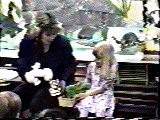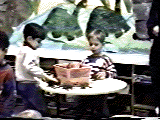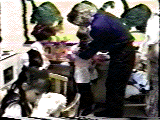The teacher and facilitator (Penny Burlak) modelling the social skill - ³sharing².

Early Childhood and Kindergarten Program
The Early Childhood and Kindergarten Program is designed for use with young students - ages 3 to 5. As with the Grades 1 - 4 Program, it presents a series of social skills lessons to the class. Each lesson begins with a 20 minute role-play, using puppets, of the subskills components of the social skill being targetted (i.e., listening, sharing, asking to play, helping others, and problem solving). The purposes ofhte this step are: (a) for children to attend to the subskill components that compose the target social skill; and, (b) for students to learn and use a common language for referring to their behavior.
Cue cards are used to help the children to identify social skill components.

The teacher and facilitator (Penny Burlak) modelling the social skill - ³sharing².

A child roleplaying the social skill.

A few children practicing the social skill of sharing.

Badges being issued.

Reinforcing children for sharing.
